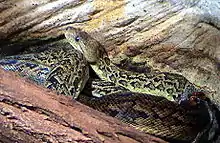Chilabothrus angulifer
Chilabothrus angulifer is a boid species found in Cuba and on some nearby islands. No subspecies are currently recognized.[3] It is also known as Cuban boa or Cuban tree boa.[1]
| Chilabothrus angulifer | |
|---|---|
 | |
| Scientific classification | |
| Kingdom: | Animalia |
| Phylum: | Chordata |
| Class: | Reptilia |
| Order: | Squamata |
| Suborder: | Serpentes |
| Family: | Boidae |
| Genus: | Chilabothrus |
| Species: | C. angulifer |
| Binomial name | |
| Chilabothrus angulifer (Cocteau and Bibron, 1840) | |
| Synonyms | |
Distribution and habitat
The species is found in Cuba and adjacent islands, including Isla de la Juventud, the Canarreos Archipelago (Cayo Cantiles), the Colorados Archipelago off the northern coast of Pinar del Río, the Sabana-Camagüey Archipelago (Cayo Guajaba and Cayo Sant María). The type locality given is "Cuba".[2][3] Habitats of this snake include tropical dry forest and scrub forest.
Hunting behavior
In May 2017, a study from the University of Tennessee was released indicating cooperative hunting of fruit bats by this species – the first documented instance of deliberate pack hunting behavior in snakes.[4]
Maturation
This species reaches maturation for breeding at 3 years old for males, and 5 years old for females. Captive snakes reach breeding maturity at larger sizes than non-captive snakes.[5]
References
| Wikimedia Commons has media related to Chilabothrus angulifer. |
- Day, M. & Tolson, P. (1996). "Chilabothrus angulifer". IUCN Red List of Threatened Species. 1996: e.T7815A12852846. doi:10.2305/IUCN.UK.1996.RLTS.T7815A12852846.en. Retrieved 1 January 2019.
- McDiarmid RW, Campbell JA, Touré T. 1999. Snake Species of the World: A Taxonomic and Geographic Reference, vol. 1. Herpetologists' League. 511 pp. ISBN 1-893777-00-6 (series). ISBN 1-893777-01-4 (volume).
- Chilabothrus angulifer at the Reptarium.cz Reptile Database. Accessed 1 January 2019.
- Dinets, Vladimir (26 May 2017). "Coordinated hunting by Cuban boas" (PDF). Animal Behavior and Cognition. 4 (1): 24–29. doi:10.12966/abc.02.02.2017. Retrieved 26 May 2017.
- Rodríguez-Cabrera, Tomas M; Lopez, Javier Torres; Marrero, Ruben; Savall, Ernesto Morell & Ochotorena, Ana Sanz (2016). "Sexual maturation in free-ranging Chilabothrus angulifer (Serpentes: Boidae)". Phyllomedusa. 15 (2): 163–174. doi:10.11606/issn.2316-9079.v15i2p163-174.
